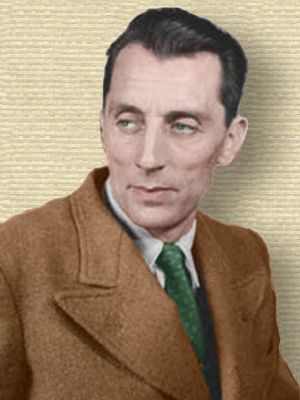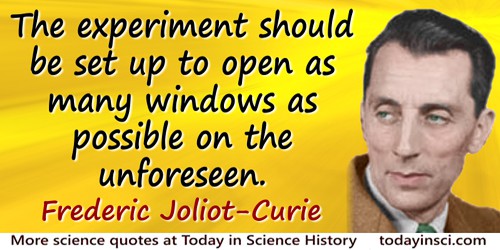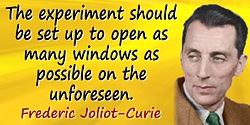Science Quotes by Frederic Joliot-Curie (4 quotes)
I have always attached great importance to the manner in which an experiment is set up and conducted ... the experiment should be set up to open as many windows as possible on the unforeseen.
— Frederic Joliot-Curie
(1954). In Charles Coulston Gillespie (ed.), Dictionary of Scientific Biography (1973), Vol. 7, 153.
Some months ago we discovered that certain light elements emit positrons under the action of alpha particles. Our latest experiments have shown a very striking fact: when an aluminium foil is irradiated on a polonium preparation [alpha ray emitter], the emission of positrons does not cease immediately when the active preparation is removed: the foil remains radioactive and the emission of radiation decays exponentially as for an ordinary radio-element. We observed the same phenomenon with boron and magnesium.
[Co-author with Irène Joliot-Curie. This one-page paper reported their discovery of artificial radioactivity for which they were awarded the 1935 Nobel Prize for Chemistry.]
[Co-author with Irène Joliot-Curie. This one-page paper reported their discovery of artificial radioactivity for which they were awarded the 1935 Nobel Prize for Chemistry.]
— Frederic Joliot-Curie
Letter to the Editor, 'Artificial Production of a New Kind of Radio-Element'(10 Jan 1934) published in Nature (1934), 133, 201-2. Cited in Mauro Dardo, Nobel Laureates and Twentieth-Century Physics (2004), 187.
The farther an experiment is from theory, the closer it is to the Nobel Prize.
Also French chemist, Irène Joliot-Curie (1897-1956)
Also French chemist, Irène Joliot-Curie (1897-1956)
— Frederic Joliot-Curie
Attributed to either.
We bombarded aluminum with alpha rays … then after a certain period of irradiation, we removed the source of alpha rays. We now observed that the sheet of aluminum continued to emit positive electrons over a period of several minutes.
— Frederic Joliot-Curie
Describing the crucial experiment made in 1934 that discovered artificial radioactivity. As quoted in John Daintith and Derek Gjertsen, A Dictionary of Scientists (1999), 287.
See also:
- 19 Mar - short biography, births, deaths and events on date of Joliot-Curie's birth.
- Frederic Joliot-Curie - context of quote “Open as many windows as possible on the unforeseen” - Medium image (500 x 250 px)
- Frederic Joliot-Curie - context of quote “Open as many windows as possible on the unforeseen” - Large image (800 x 400 px)




 In science it often happens that scientists say, 'You know that's a really good argument; my position is mistaken,' and then they would actually change their minds and you never hear that old view from them again. They really do it. It doesn't happen as often as it should, because scientists are human and change is sometimes painful. But it happens every day. I cannot recall the last time something like that happened in politics or religion.
(1987) --
In science it often happens that scientists say, 'You know that's a really good argument; my position is mistaken,' and then they would actually change their minds and you never hear that old view from them again. They really do it. It doesn't happen as often as it should, because scientists are human and change is sometimes painful. But it happens every day. I cannot recall the last time something like that happened in politics or religion.
(1987) -- 


